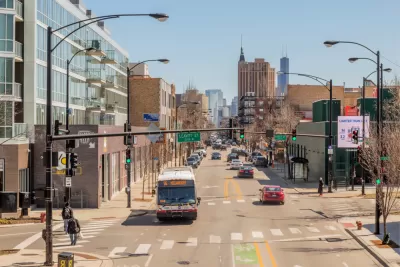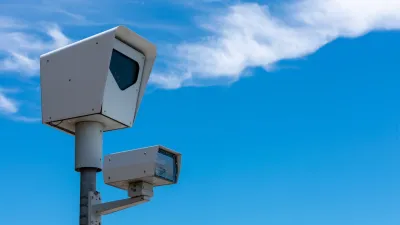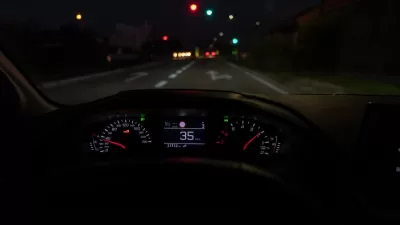The city's controversial traffic camera program tickets Black and Latino motorists more than white drivers. Infrastructure may play a role in why.

An investigation from ProPublica's Emily Hopkins and Melissa Sanchez reveals that Chicago's purportedly neutral traffic enforcement cameras issued citations to households in majority Black and Latino ZIP codes at a rate twice as high as in white neighborhoods. In 2020, when Black and Latino workers were more likely to keep going to work while many white workers worked from home, the ticketing rate in Black neighborhoods jumped to three times that of white areas. The traffic camera program monitors almost 300 locations distributed "roughly evenly" in the city's different neighborhoods. "The consequences have been especially punishing in Black neighborhoods, which have been hit with more than half a billion dollars in penalties over the last 15 years, contributing to thousands of vehicle impoundments, driver’s license suspensions and bankruptcies, according to ProPublica’s analysis."
Traffic camera programs in other cities, such as Rochester, Miami, and Washington, D.C., have shown similar disparities in ticketing, calling into question the supposed fairness of the devices, which have been touted by some supporters as a "race-neutral" way to reduce potentially violent police interactions. Chicago mayor Lori Lightfoot's policy chief, Dan Lurie, has said "the administration has been grappling with the 'twin challenges' of improving traffic safety while 'very intentionally ensuring that the burdens of fines and fees as a result of those kinds of efforts do not fall disproportionately on Black and brown residents.'" Lurie acknowledged the need to improve road infrastructure as part of the effort to reduce traffic fatalities and protect pedestrians.
While research shows traffic cameras can have a positive impact on driving behaviors, some critics call them a cash grab that disproportionately harms low-income residents. Instead, experts point to other traffic calming measures, such as medians and speed bumps, that can slow drivers.
The article details other factors that affect driver speeds and pedestrian safety, such as road width, residential density, and proximity to expressways—roads disproportionately built through historically Black neighborhoods.
FULL STORY: Chicago’s “Race-Neutral” Traffic Cameras Ticket Black and Latino Drivers the Most

Planetizen Federal Action Tracker
A weekly monitor of how Trump’s orders and actions are impacting planners and planning in America.

Map: Where Senate Republicans Want to Sell Your Public Lands
For public land advocates, the Senate Republicans’ proposal to sell millions of acres of public land in the West is “the biggest fight of their careers.”

Restaurant Patios Were a Pandemic Win — Why Were They so Hard to Keep?
Social distancing requirements and changes in travel patterns prompted cities to pilot new uses for street and sidewalk space. Then it got complicated.

Platform Pilsner: Vancouver Transit Agency Releases... a Beer?
TransLink will receive a portion of every sale of the four-pack.

Toronto Weighs Cheaper Transit, Parking Hikes for Major Events
Special event rates would take effect during large festivals, sports games and concerts to ‘discourage driving, manage congestion and free up space for transit.”

Berlin to Consider Car-Free Zone Larger Than Manhattan
The area bound by the 22-mile Ringbahn would still allow 12 uses of a private automobile per year per person, and several other exemptions.
Urban Design for Planners 1: Software Tools
This six-course series explores essential urban design concepts using open source software and equips planners with the tools they need to participate fully in the urban design process.
Planning for Universal Design
Learn the tools for implementing Universal Design in planning regulations.
Heyer Gruel & Associates PA
JM Goldson LLC
Custer County Colorado
City of Camden Redevelopment Agency
City of Astoria
Transportation Research & Education Center (TREC) at Portland State University
Camden Redevelopment Agency
City of Claremont
Municipality of Princeton (NJ)





























